Guide

Page i
Mixed-Member Electoral Systems in Constitutional Context
Reformers have promoted mixed-member electoral systems as the best of both worlds. In this volume, internationally recognized political scientists evaluate the ways in which the introduction of a mixed-member electoral system affects the configuration of political parties. The contributors examine several political phenomena, including cabinet post allocation, nominations, preelectoral coalitions, split-ticket voting, and the size of party systems and faction systems. Significantly, they also consider various ways in which the constitutional systemespecially whether the head of government is elected directly or indirectlycan modify the incentives created by the electoral system.
Part I of the book provides an in-depth comparison of Taiwan and Japan, both of which moved from single nontransferable vote systems to mixed-member majoritarian systems. These cases demonstrate that the higher the payoffs of attaining the executive office and the greater degree of cross-district coordination required to win it, the stronger the incentives for elites to form and stay in the major parties. In such a context, a country will move rapidly toward a two-party system. In Part II, the contributors apply this theoretical logic to other countries with mixed-member systems and find that executive competition has the same effect on legislative electoral rules in countries as disparate as Thailand, the Philippines, New Zealand, Bolivia, and Russia.
The findings presented here demonstrate that the success of electoral reform depends not only on the specification of new electoral rules per se but also on the political contextand especially the constitutional frameworkwithin which such rules are embedded.
Page ii
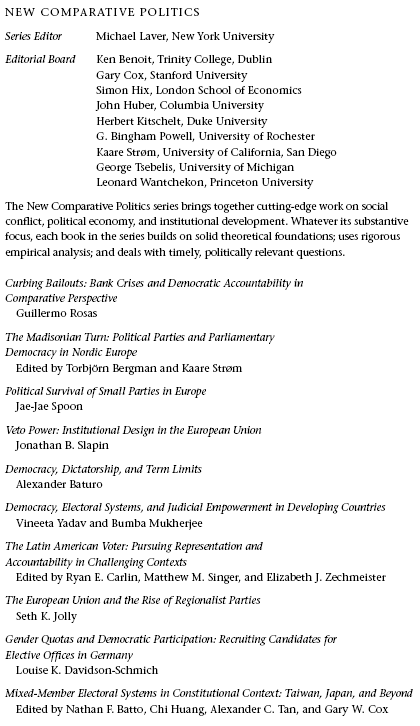
Page iii
Mixed-Member Electoral Systems in Constitutional Context
Taiwan, Japan, and Beyond
Edited by Nathan F. Batto, Chi Huang, Alexander C. Tan, and Gary W. Cox
University of Michigan Press
Ann Arbor
Page iv Copyright by the University of Michigan 2016
All rights reserved
This book may not be reproduced, in whole or in part, including illustrations, in any form (beyond that copying permitted by Sections 107 and 108 of the U.S. Copyright Law and except by reviewers for the public press), without written permission from the publisher.
Published in the United States of America by the
University of Michigan Press
A CIP catalog record for this book is available from the British Library.
Library of Congress Cataloging-in-Publication Data
Names: Batto, Nathan F., editor. | Huang, Chi, 1953 editor. | Tan, Alexander C., editor. | Cox, Gary W., editor.
Title: Mixed-member electoral systems in constitutional context : Taiwan, Japan, and beyond / edited by Nathan F. Batto, Chi Huang, Alexander C. Tan, and Gary W. Cox
Description: Ann Arbor : University of Michigan Press, 2016. | Series: New comparative politics | Includes bibliographical references and index.
Identifiers: LCCN 2015038638| ISBN 9780472119738 (hardback) | ISBN 9780472121588 (ebook)
Subjects: LCSH: Proportional representationTaiwan. | Proportional representationJapan. | Representative government and representationTaiwan. | Representative government and representationJapan. | Political partiesTaiwan. | Political partiesJapan. | ElectionsTaiwan. | ElectionsJapan. | Electoral systems | BISAC: POLITICAL SCIENCE / Political Process / Elections.
Classification: LCC JQ1536 .M59 2016 | DDC 324.6dc23
LC record available at http://lccn.loc.gov/2015038638
Page v
The genesis of this volume lies in an attempt to answer a basic research question that surfaced in a roundtable of the second annual Asian Election Studies Conference held at the Election Study Center (ESC) of the National Chengchi University (NCCU), Taiwan, in May 2010. Why was it that Taiwan and Japan, two similar East Asian countries that had both switched from similar single nontransferable vote to similar mixed-member majoritarian legislative electoral systems, had displayed such divergent speeds and degrees in moving toward the theoretically expected consolidation of their party systems? A brainstorm with Gary Cox during his visit to the ESC in November 2011 sparked the idea of taking into account the constitutional context in which the electoral systems operate.
As with any book-length project, we have a number of people and institutions to thank. We thank the ESC and its director, Lu-huei Chen, for continuous administrative support throughout the life of the project. A book with twenty-one coauthors based in fifteen institutions spanning four countries needs some sort of institutional base, and the ESC provided that home. We also wish to acknowledge our four home institutions, the Institute of Political Science at Academia Sinica, National Chengchi University, the University of Canterbury, and Stanford University. In addition to paying our salaries, the four institutions have allowed us the time and resources necessary to complete this book.
All the chapters are original contributions prepared specifically for this book. Earlier versions of most of the chapters in this volume were presented at the workshop on Elections in Taiwan and Japan under the Page vi Mixed-Member Majoritarian System held on April 20, 2012, at ESC of NCCU in Taiwan. The workshop was funded by the Election and Citizens Participation (ECP) Project, a Top University grant from the Ministry of Education in Taiwan with Chi Huang as the principal investigator. We would like to extend thanks to all the scholars from Taiwan, Japan, the United States, and New Zealand who participated in the workshop and patiently worked with us on completing this edited book project.
We express our deepest appreciation and admiration to Lu-huei Chen, Yin-lung Chou, Shih-chan Dai, Tzu-ping Liu, Hung-chung Wang, Chung-li Wu, and Misa Nishikawa for their intellectual contributions and tolerance in the face of our unreasonable requests.
Finally, we have more personal debts of gratitude. Nathan Batto thanks his wife, Lavai Fu-yi Yang, for her patience, encouragement, and inspiration. Chi Huang thanks Election and Citizens Participation Project assistant ZeQui He for his help in compiling the manuscript for this edited volume during the review process.
Page vii
Contents
Nathan F. Batto and Gary W. Cox
Chi Huang, Ming-Feng Kuo, and Hans Stockton
Jih-wen Lin
Yoshiaki Kobayashi and Hiroki Tsukiyama
Nathan F. Batto and Hsin-ta Huang
Eric Chen-hua Yu, Kaori Shoji, and Nathan F. Batto
Kuniaki Nemoto and Chia-hung Tsai
- Page viii
T. Y. Wang, Chang-chih Lin, and Yi-ching Hsiao
Allen Hicken
Matthew S. Shugart and Alexander C. Tan
Nathan F. Batto, Henry A. Kim, and Natalia Matukhno
Chi Huang
Page ix
General Terms
CSM candidate selection method
HC House of Councillors
HR House of Representatives
MM mixed-member
MMM mixed-member majoritarian
MMP mixed-member proportional
Nlocal average effective number of electoral parties in each district
NPR effective number of electoral parties in PR tier

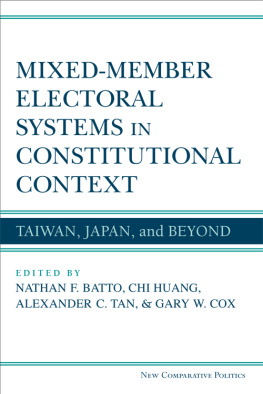

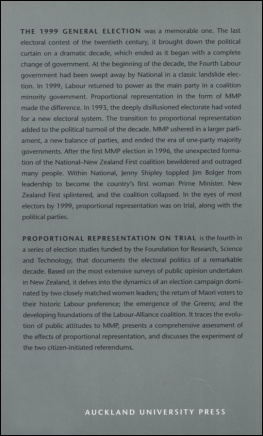

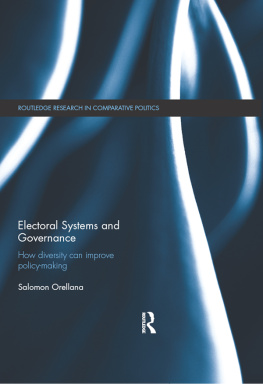
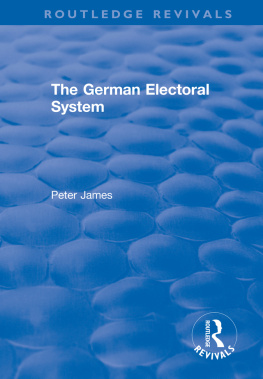
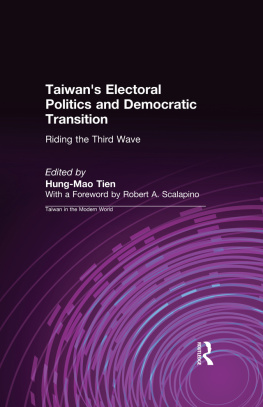
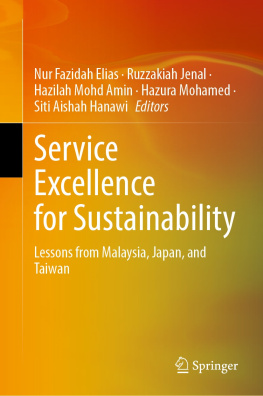
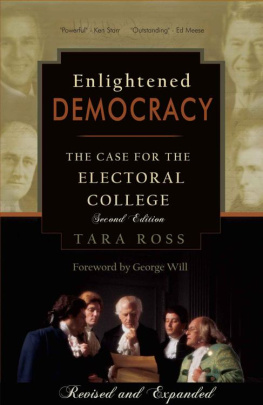



 Page i
Page i  Page iii
Page iii